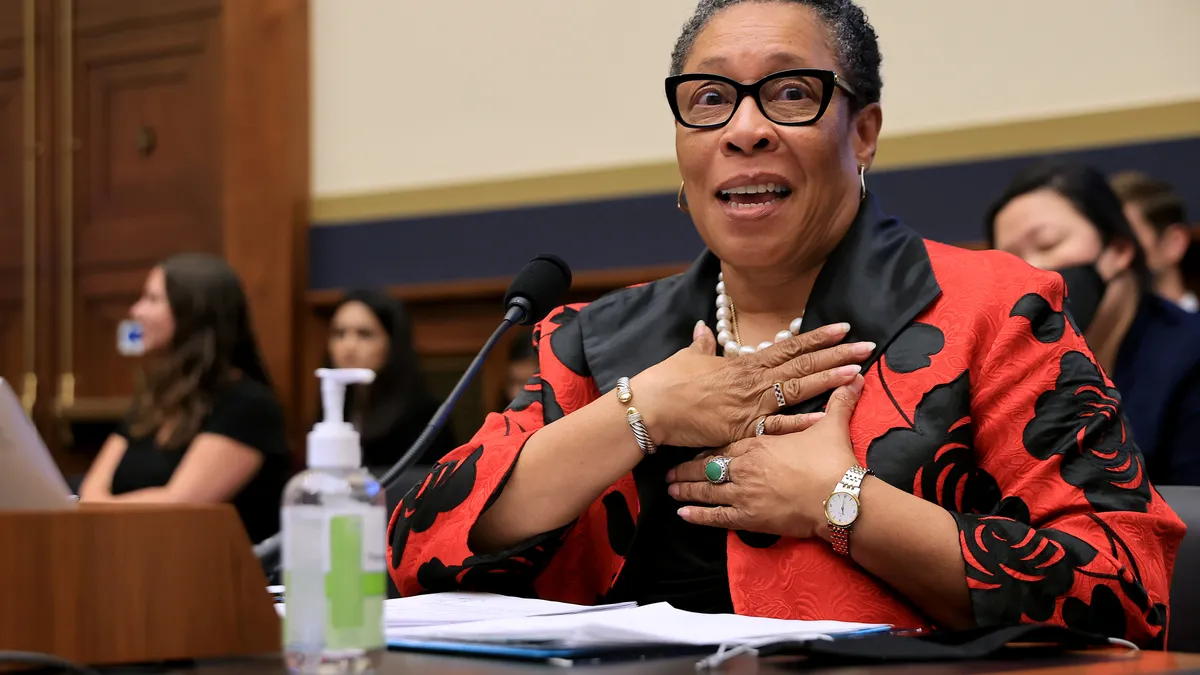Dive Brief:
- In the wake of President Joe Biden’s vow to tackle “junk fees” in his recent State of the Union address, Housing and Urban Development Secretary Marcia Fudge released an open letter to the housing industry on Thursday asking housing providers and local governments to “adopt policies that promote fairness and transparency of fees faced by renters.”
- Fudge proposed that housing providers and state and local governments take steps to limit and better disclose fees charged to renters and ensure they reflect actual and legitimate costs to housing providers.
- The HUD secretary took specific aim at application fees, which can add up for renters applying at multiple properties.
Dive Insight:
Many renters face “hidden, duplicative or unnecessary” fees when searching for and leasing apartments, according to Fudge. “These fees limit options for renters and strain household budgets, particularly for renters with low and modest incomes who already face high rental cost burdens,” she wrote.
To promote fairness and transparency, Fudge encouraged housing providers and property managers to adopt four policies, including:
- Eliminating or limiting application fees to only those necessary to cover actual and legitimate costs for services.
- Allowing a single fee to cover multiple applications on the same platform or across multiple properties owned by one housing provider or managed by one company across providers.
- Eliminating duplicative, excessive and undisclosed fees throughout the leasing process, including administrative and other processing fees.
- Identifying bottom-line amounts tenants will pay for move-in, monthly rent and additional recurring costs in advertisements and lease documents.
Fudge pointed to hidden costs that renters could incur, including move-in, late, high-risk and convenience fees. “Even after renters secure housing, their monthly cost may exceed the listed price of the unit due to hidden and unnecessary fees,” she wrote.
Fudge noted that these application fees often pay for tenant screening reports, which she said may have “inaccurate information and questionable validity in predicting renter behavior.”
Other federal agencies have noted issues with background checks. Last year, the Consumer Financial Protection Bureau issued two reports that noted background checks contained “largely unvalidated information of uncertain accuracy or predictive value.” Renters bear the costs of these errors and have few avenues for fixing them, according to the bureau.
The HUD secretary encouraged property operators to communicate clearly if a tenant screening report is used to reject an applicant or increase fees. While none of these principles has the force of law, the HUD secretary wants them to provide applicants with the opportunity to address inaccurate information in these reports.
“If prospective renters are not given the opportunity to review and correct the information in these reports, then these renters may end up paying numerous application fees only to be repeatedly rejected for this inaccurate information in their tenant screening reports,” Fudge wrote.
Industry reaction
Industry reaction to Fudge’s recommendations was mixed.
Sharon Wilson Géno, the National Multifamily Housing Council’s president, said the appeals around application fees and processing complement her members' commitment to resident-centered management practices. However, the association noted the industry already faces a broad array of state and local laws that regulate things like security deposits, application fees and fair housing requirements beyond the federal criteria.
“NMHC is supportive of innovative and thoughtful approaches to streamlining application fees and screenings, but encourages federal policymakers to be mindful that the resident-housing provider relationship is already carefully regulated and overseen at local and state levels of government,” she told Multifamily Dive.
In addition, the National Apartment Association’s Nicole Upano, assistant vice president of housing policy and regulatory affairs, said that these fees are warranted.
"Rental application fees are a necessary part of doing business, helping cover the costs associated with responsible screening,” Upano said. “It is paramount that housing providers retain the ability to screen prospective residents and ensure the long-term viability of rental communities."
Click here to sign up to receive multifamily and apartment news like this article in your inbox every weekday.











